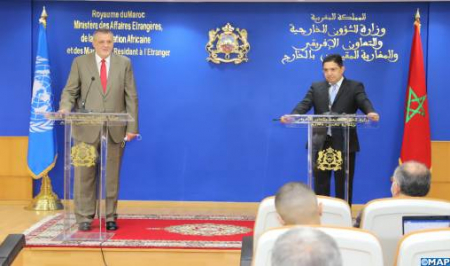Libyan Crisis: FM Stresses Need to Build on Progress Made to Successfully Hold December Elections
Minister of Foreign Affairs, African Cooperation and Moroccans Abroad Nasser Bourita, stressed on Monday, the need to build on progress made in the Libyan question to successfully hold December’s elections. “We must build on the progress made at the military, institutional and political levels to succeed in these elections,” Bourita said at a joint press briefing, following talks with Jan Kubis, Special Envoy of the UN Secretary-General for Libya and head of the UN Support Mission in Libya (UNSMIL). He reasserted Morocco’s readiness to work with the Libyan parties and the UN to successfully hold the electoral process. “Morocco believes that the settlement of the situation in Libya must go through elections, by being prepared as best as possible on the legal and logistical aspects,” he added. The Libyan crisis, which is a crisis of legitimacy, “can only be resolved through a democratic exercise in which all Libyans must participate,” he noted. Recalling the position of the Kingdom in the resolution of the Libyan crisis, Bourita stressed that “Morocco has no agenda and no solution” in this question. He explained that the role of Morocco, following the vision of HM King Mohammed VI, is to create a space for dialogue for Libyans to reach an agreement, and to support the role of the United Nations, “as an essential platform in the unification and coordination of international efforts to resolve the crisis in Libya.” The minister commended the roles of the UN Secretary General’s Special Envoy for Libya and the UN Support Mission in Libya (UNSMIL) in strengthening the stability of the country. For his part, Kubis expressed his gratitude to Morocco for being a strong partner and an active player in the international community for supporting the political process that should lead to more stability, unity and cooperation in Libya. “The country will have new institutions and authorities, a strong democracy and legitimacy to overcome several challenges facing not only Libya but many countries in the region,” he said. He expressed his appreciation to HM King Mohammed VI for Morocco’s “availability”, its “deep cooperation” to help the Libyan parties find their way, as well as for the Kingdom’s support to the United Nations efforts in Libya, expressing the willingness that Morocco will continue to play this “very decisive” role in the future. “We will leverage on the achievements of this cooperation to help Libya move to the next phase, through this political process marked by the December 24 elections,” he noted.

